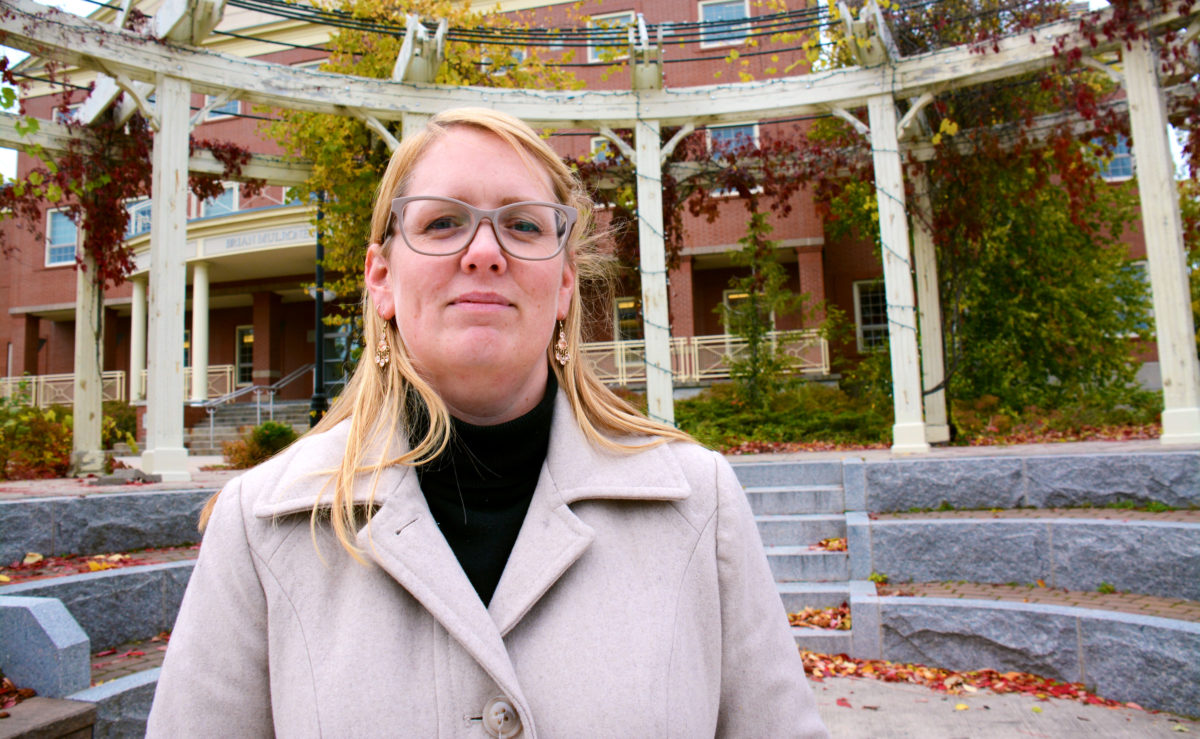When Danielle Connell saw the dead body of Alan Kurdi on the front page of a newspaper at the Harriet Irving Library, she thought for a moment he was her son.
“I thought it was my son. [He] looked exactly like him. It was my son, dead, on the front cover of the Globe and Mail or whatever paper it was,” Connell said. “The feeling will never leave me.”
“And I just thought, ‘If that was my son on the front page of the paper, I would hope people were rioting in the streets.’”
Kurdi is a three-year-old Syrian boy who made international headlines after drowning in the Mediterranean Sea on Sept. 2, 2015. Kurdi and his family were fleeing the Syrian civil war.
“If my country were torn apart violently and I lost everything, I hope somebody would give a shit,” Connell said.
Connell, a research services officer at St. Thomas University, is one of approximately 12 people in the community who is working to bring a Syrian refugee family to Canada. In 2015, the university started sponsoring the Al Khleifs, a family from northern Syria living in Lebanon. The Aquinian has chosen to identify the family only by their last name to protect their safety.
Connell said sponsoring the family has been a four year process — and it isn’t over yet.
“We’re not helping them because it’s going to do anything for us. It’s just the human thing to do … it’s the STU thing to do.”
Coming together
The day after the photo of Kurdi made headlines around the world, St. Thomas faculty and staff got together to discuss what they could do to help Syrian refugees.
“We didn’t know anything about sponsorship or anything, but we thought ‘What is something we can do that will have a meaning for us and something that will have a real impact?” Connell asked.
They bounced around several ideas until February 2015, when Great Books professor Matt Dinan proposed the idea of sponsoring the relative of a family St. Dunstan’s Catholic Church in Fredericton was already sponsoring.
To bring a family to Canada, St. Thomas needed to find a sponsorship agreement holder – an organization that can sponsor refugees themselves or work with others to sponsor refugees. St. Thomas was able to use the Catholic Church as their sponsorship agreement holder because of the university’s catholic affiliation.
Although using the church as a sponsorship agreement holder reduced the amount of paperwork the university had to do, it still took a year for Connell to complete all the paperwork associated with sponsoring a family.
She said the paperwork was “unbelievable.”
“Because we were such a big group, because we were going through a sponsorship agreement holder, we had to create a detailed settlement plan. We had to have our finances in order. We had to demonstrate that we had $25,000 in cash saved.”
Still, Connell has kept a photo of the Al Khleifs taped to her computer monitor for three years.
“[The photo] kept me going on the days when I would rather be worrying about something else,” she said. “I’d see their faces and think, ‘These are real people and they need our help.’”
Connell also had the opportunity to video chat with the family once through WhatsApp.
“It was the middle of the night for them . . . they got up and got dressed and they brushed their hair and — well it was the middle of the night and they looked tired, but they looked thin,” Connell said.
Although Connell took the lead on writing the refugee application, she’s also received help from others, including Dinan, a relative of the Al Khleifs and fourth-year student Kate Archibald.
Archibald, who joined the team in 2017, said the university and Fredericton have “really come together” to support the family.
“My email inbox is exploding with people asking to help, not only with donations but offering money, offering rides.”
Archibald said there was one person who was downsizing from a house to an apartment and donated two-thirds of her possessions.
She also said that it’s difficult for people to get rid of the stereotypes they have about refugees.
“No one wants to be called a refugee and we label people solely as that,” Archibald said.
“These are ordinary people who are fighting and fleeing for a life that we take for granted.”
‘Welcome to Canada’
In August 2018, the Al Khleif family completed the interview process for coming to Canada.
On Aug. 15, the Al Khleif family were told by an immigration representative in Beirut, “Welcome to Canada.”
“Our hearts just about burst,” Connell said.
She said she has also been notified that the family has completed their medical exam too.
Still, the security screening for the family is ongoing and Connell said that may take awhile.
“It depends on the visa office in Beirut and it depends on how many files they’re processing,” Connell said. After the security screening, the family may also need to get exit permits to leave Lebanon.
And at home in Canada there’s still lots to be done before the Al Khleif family arrives.
Connell and Archibald have been collecting beds, dressers, kitchen supplies and non-perishable food items to give the family when they arrive. Archibald said they have most of the items, but they still need a dining room table, boxes for storage and money.
“As soon as they land we’re going to have to pay for their flights and we don’t really have that money saved yet,” Connell said. The Al Khleif family’s tickets are initially paid for by the government, but after landing in Canada they’ll receive a bill for the flights.
Archibald and Connell are happy with how St. Thomas and Fredericton have come together to help support the family before they’ve arrived.
“There’s nothing we can do [now] except just keep waiting,” Archibald said.

